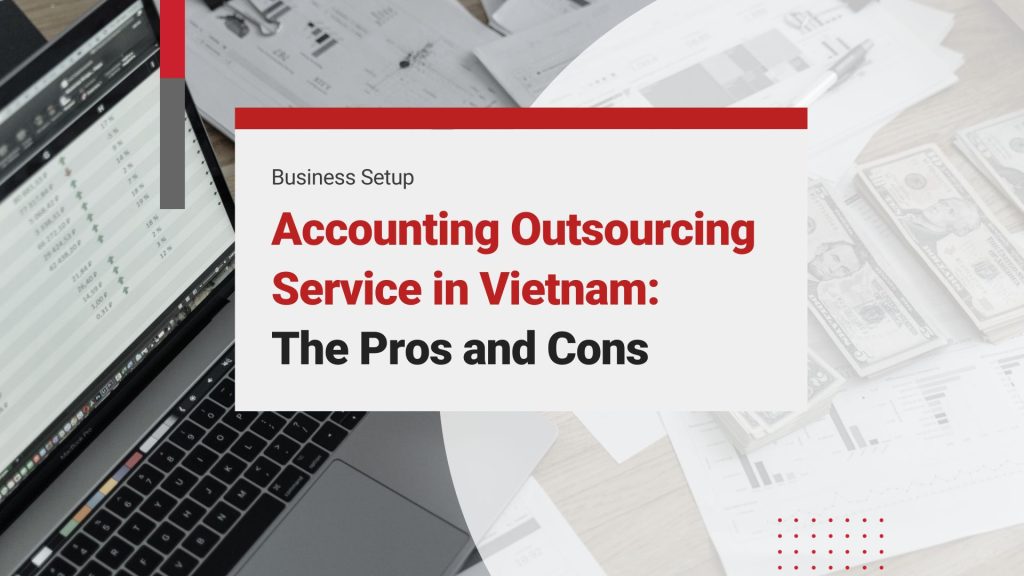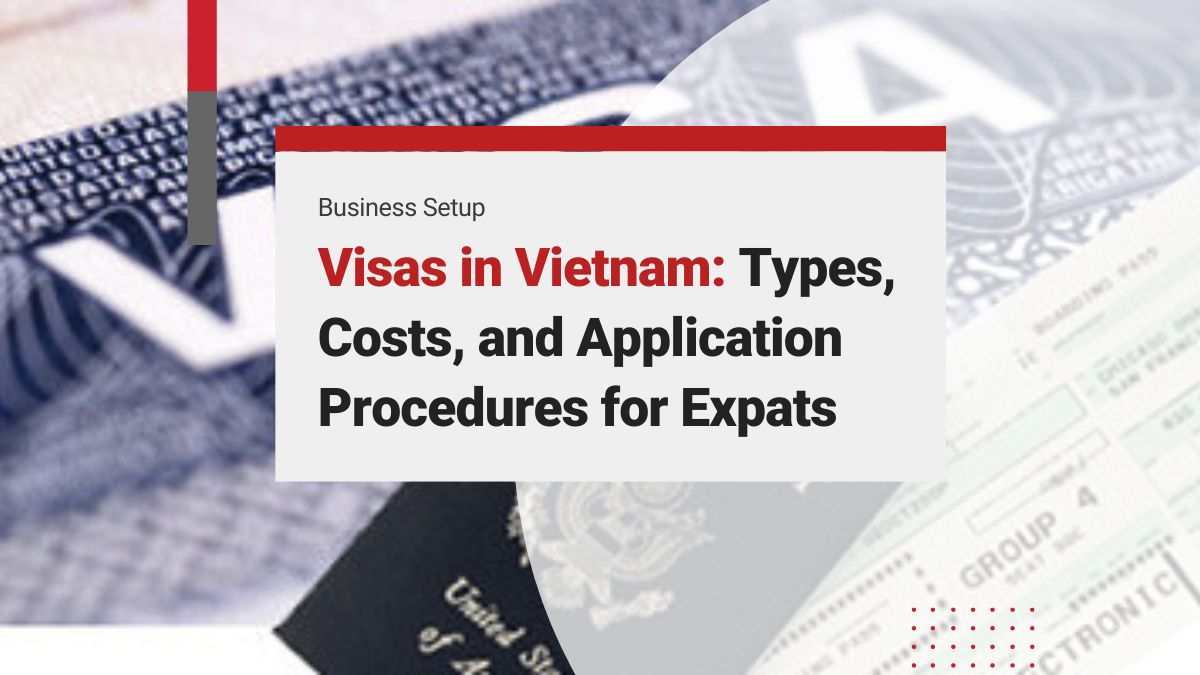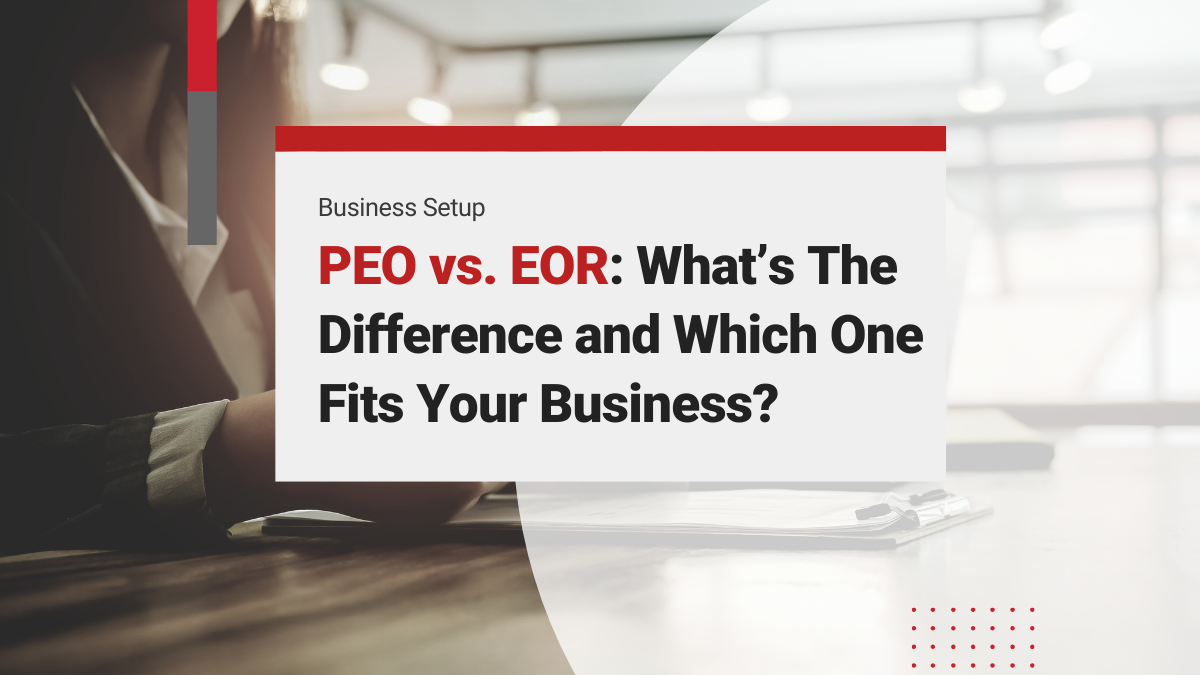Accounting tasks are vital to any business, but managing them in-house can be challenging—especially in Vietnam’s dynamic regulatory environment. From handling payroll to tracking accounts receivable/payable, the complexities of compliance and reporting can overwhelm startups and SMEs focusing on their core business. Assumptions or mistakes in accounting may lead to penalties or setbacks, so many companies turn to accounting outsourcing as a strategic solution. By outsourcing accounting functions to qualified local experts, businesses can ensure accuracy and compliance while devoting more energy to growth and clients.
One key challenge for companies in Vietnam is navigating the tax system. Vietnam imposes several taxes that businesses must understand and comply with. Below are five of the most common taxes in Vietnam and recent updates:
What are the 5 Most Common Taxes in Vietnam?
Corporate Income Tax – CIT
Corporate Income Tax (CIT) is a direct tax on company profits. Vietnam’s standard CIT rate is 20% for most businesses, while preferential rates of 10%, 15%, or 17% apply to targeted sectors such as high-tech, education, or renewable energy to attract investment. Under the new CIT law effective 2025, Vietnam introduces a tiered rate based on annual revenue:
- 15% for firms earning up to VND 3 billion,
- 17% for those up to VND 50 billion,
- 20% for larger companies.
This reform reduces tax burdens for SMEs while keeping the standard 20% rate for large corporations. Certain industries, like oil and gas, still face higher CIT rates between 32% and 50% under special rules.
Read More: Corporate Income Tax (CIT) in Vietnam: A Comprehensive Overview
Value-Added Tax – VAT
Value-Added Tax (VAT) is an indirect tax on goods and services consumption. The standard rate is 10%, but Vietnam temporarily reduced it to 8% to boost economic recovery. This 2% reduction, first introduced in 2022, is extended until December 31, 2026. Essential goods and certain services are taxed at 5% or 0%, while others are exempt. Businesses must apply the correct rate, file VAT returns monthly or quarterly, and issue electronic invoices. Tax authorities have also tightened VAT compliance, requiring proper e-invoicing and documentation for VAT refunds.
Read More: 2023 Essential Insights: Vietnam’s Value-Added Tax (VAT) Landscape
Personal Income Tax – PIT
Personal Income Tax (PIT) applies to individuals’ income in Vietnam. Residents are taxed progressively from 5% to 35%, with income above VND 960 million (around USD 38,400) subject to the top rate. Non-residents (staying under 183 days) pay a flat 20% on Vietnam-sourced income. Employers must withhold and remit PIT monthly or quarterly. Though PIT rates have stayed stable, authorities regularly update rules, such as for foreign remote workers. Accurate PIT calculation, deductions, and annual finalization remain key to payroll compliance in Vietnam.
Read More: Personal Income Tax (PIT) in Vietnam: A Guide for Foreign Investors
Foreign Contractor Withholding Tax – FCWT
Foreign Contractor Withholding Tax (FCWT) applies to foreign entities or individuals earning income in Vietnam without a local presence. The Vietnamese client withholds the tax from payments. FCWT combines VAT and CIT (or PIT)—usually 5% VAT and 5–10% CIT, depending on the service. For example, consulting is taxed at 5% VAT and 5% CIT, while royalties face 5% VAT and 10% CIT. Proper withholding ensures compliance when paying overseas service providers.
Business License Tax
Business License Tax (BLT) is a small annual fee every registered business in Vietnam must pay. The amount depends on registered or investment capital, ranging from VND 1–3 million per year (around USD 40–130). New companies must pay BLT in their first month of operation and then annually, usually in January. Firms with capital above VND 10 billion (~USD 400,000) pay VND 3 million; smaller ones pay VND 2 million, and representative offices about VND 1 million. Though minor, it is a mandatory obligation, and late payment can lead to penalties.
Compliance Tip:
Vietnam enforces e-filing and e-invoicing for all taxes. Declarations for CIT, VAT, PIT, and others must be submitted via the national electronic tax portal, using digitally signed e-invoices. Key deadlines include:
- Monthly VAT: due by the 20th of the following month
- Quarterly CIT: due by the end of the next month
- Annual CIT finalization: due within 90 days after year-end
Partnering with an accounting outsourcing firm helps ensure timely submissions, compliant software, and full adherence to Vietnam’s tax regulations—avoiding penalties or reporting errors.
Download the detailed guide about Taxation & Compliance Deadlines in Vietnam now!
Tax Incentives in Vietnam
Vietnam offers corporate tax incentives to attract investment. Qualified companies can enjoy a 4-year CIT exemption followed by 9 years at 50% CIT, and preferential rates of 10% for up to 15 years in priority sectors.
To qualify, firms must invest in encouraged sectors or regions or obtain High-Tech or Agricultural Technology Enterprise certificates. Incentive periods start from the first profit-making year or the certification year.
Under the 2025 CIT law, location-based incentives are being phased out, while those for high-tech, green energy, and R&D projects are strengthened. Businesses should consult local tax experts or accounting outsourcing firms to manage applications and ensure compliance.
Read More: Tax Incentives in Vietnam: A Guide for Foreign Companies (2023 Update)
What is Accounting Outsourcing Services in Vietnam?
Accounting outsourcing involves hiring external experts to manage your company’s accounting and finance tasks. In Vietnam, it’s a common, cost-effective choice for foreign and local businesses aiming for compliance and efficiency.
Providers typically handle bookkeeping, tax filings, payroll, reporting, and compliance, acting as an off-site accounting team aligned with Vietnamese laws. They stay current with regulatory changes, helping companies avoid errors and penalties.
Outsourcing doesn’t mean losing control—it allows business owners to focus on growth while professionals ensure financial accuracy. For startups and SMEs, it’s like having a virtual CFO, enabling smoother operations and strategic focus.
Which Accounting Outsourcing Services Are Prioritized?
Payroll Processing
Payroll in Vietnam is complex, involving labor laws, taxes, and insurance contributions such as social, health, and unemployment insurance. Regulations change frequently, making compliance challenging.
Outsourcing payroll ensures accurate calculations, timely payments, and full compliance with government rules. Providers handle tax deductions, leave tracking, and benefits, preventing costly errors and saving HR teams valuable time. Partnering with an accounting outsourcing firm keeps payroll smooth and compliant across all updates.
Want to find more about Payroll Processing? Check out InCorp Vietnam’s Payroll Outsourcing Services
General Accounting and Bookkeeping
Bookkeeping is the core of accounting, involving daily recording of all sales, purchases, expenses, and receipts. These records feed into general accounting, which produces financial statements and summaries. Because the work is detail-heavy, even small errors can lead to inaccurate reports or poor decisions.
By outsourcing bookkeeping and ledger management, companies ensure every transaction is accurately recorded under proper accounting standards. Providers use cloud-based accounting software to automate entries, reconcile bank statements, and close books monthly. With an accounting outsourcing partner, businesses always have up-to-date, reliable financial data for timely decision-making.
Financial Report and Management Report
Preparing financial statements (balance sheet, income, and cash flow) and management reports is essential for compliance and business planning. In Vietnam, companies must follow Vietnamese Accounting Standards (VAS) and, when required, submit audited financials.
If accounting and bookkeeping are already outsourced, it’s practical to outsource reporting too. The same provider has all financial data, enabling quick, compliant report generation. They ensure accuracy in tax adjustments, depreciation, and disclosures, and can produce tailored management reports like profit analysis or cash flow forecasts.
Nominee Chief Accountant
For many foreign businesses or startups in Vietnam, hiring a full-time chief accountant is not practical. Through the “Nominee Chief Accountant” service, an outsourcing firm can assign a certified professional on a part-time basis to fulfill this legal role. The nominee acts as the company’s chief accountant of record, signing documents, overseeing accounts, and liaising with tax authorities. This helps companies meet legal requirements and ensure compliance without the cost of a full-time hire. The nominee also coordinates with the accounting team and can assist with tasks such as opening bank accounts.
Pros of Accounting Outsourcing in Vietnam

Less expenditure
Outsourcing accounting helps companies cut costs by replacing expensive in-house teams with a fixed service fee. It eliminates costs for salaries, training, software, and office space. Professional providers also reduce the risk of costly compliance errors or missed deductions. Although there is a service fee, it is offset by avoiding fines and freeing up capital. In short, outsourcing delivers expert service at a predictable and often much lower cost than maintaining an internal team.
Increased profits and focus on core business
By outsourcing accounting, businesses can focus on revenue-generating activities instead of routine bookkeeping or tax work. This allows managers to spend more time on clients, sales, and strategy.
With professionals handling accounting accurately in the background, companies improve productivity, build stronger client relationships, and achieve higher profits through better focus and efficiency.
Minimized risks
Vietnam’s tax and accounting rules are complex and frequently updated. Outsourcing to a local expert ensures full compliance with current laws and reduces the risk of penalties or audits.
These firms stay updated, use internal checks, and handle all filings correctly and on time—helping protect a company’s reputation and operations.
Business decisions are made faster
A reliable outsourced team provides timely, accurate financial reports, helping management make quick and informed decisions. They ensure smooth day-to-day operations—closing books, paying vendors, and generating reports on time—while also offering strategic insights from their experience. This real-time visibility improves planning and responsiveness to market changes.
Read About InCorp Vietnam’s Accounting Outsourcing Services in Vietnam
Cons of Accounting Outsourcing in Vietnam
Communication and control challenges
A key concern in outsourcing is losing oversight of financial matters. Miscommunication can cause errors or delays if expectations are unclear. To prevent this, set up clear communication channels, assign a dedicated contact, and agree on regular reporting schedules. Using cloud-based accounting systems also allows real-time access to financial data. With open communication and regular reviews, you can stay informed and maintain full control over your accounts.
Data security and confidentiality
Sharing financial data with a third party raises security concerns. However, reputable firms use encrypted systems, secure transfers, and staff NDAs to protect client data. Always check a provider’s security practices and include confidentiality clauses in your contract. You may start with less-sensitive tasks before expanding the scope as trust builds. With proper safeguards and a reliable partner, businesses can outsource accounting confidently without compromising sensitive information.
Read More: Top 10 Drawbacks of Doing Business in Vietnam for Foreign Investors
How to Outsource Accounting Services in Vietnam?
- Identify Your Motivation: Determine the key reasons driving your decision to outsource, which may include cost reduction, improved business performance, or access to specialized skills.
- Select the Right Partner: Choose an outsourcing partner aligned with your business goals, considering factors like cultural compatibility, communication capabilities, technology infrastructure, and track record.
- Choose the Outsourcing Model: Decide on the outsourcing model that best suits your needs, whether it’s freelancers, project-based, business process outsourcing (BPO), or the build-operate-transfer model.
- Involve Your Local Team: Communicate openly with your local team about the outsourcing strategy, addressing any concerns and empowering them with your firm’s vision.
- Prepare an Implementation Plan: Develop a comprehensive outsourcing implementation plan that outlines project specifications, guidelines, and communication strategies. Collaborate with your outsourcing provider to bridge any gaps.
Read More: Top Business Process Outsourcing (BPO) Company: Benefits and Services in Vietnam

clients worldwide

professional staff

incorporated entities in 10 years

compliance transactions yearly
Learn the Right Setup for Business
Expansion in the Vietnam
Frequently Asked Questions
Are 90% of Cfos outsourcing accounting functions?
- No, 90% of CFOs are not outsourcing all accounting functions, but many CFOs are increasingly outsourcing certain functions, particularly routine or transactional tasks like payroll processing or bookkeeping. According to various industry surveys, a significant majority of CFOs use outsourcing to improve efficiency and focus internal resources on strategic financial management, but the figure varies by industry and company size.
What Is Accounting Outsourcing
- Accounting outsourcing is the practice of hiring an external firm or service provider to handle a company’s accounting and financial tasks. This can include bookkeeping, payroll, tax preparation, and financial reporting.
What is outsourcing in accounting?
- Outsourcing in accounting refers to the practice of hiring an external service provider to handle accounting functions such as bookkeeping, payroll, tax compliance, and financial reporting. This allows companies to access experienced professionals, reduce operational costs, and focus on core business activities.
Why Outsource To Vietnam
- Vietnam offers a skilled, cost-effective workforce, strong technical expertise, and a growing IT infrastructure. Its favorable business environment and time zone compatibility with major markets also enhance collaboration and efficiency.






